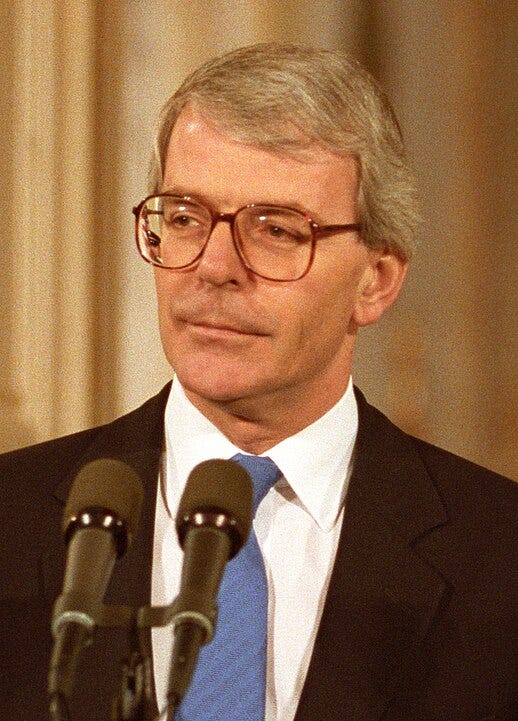‘Put up or shut up’ - The 1995 Conservative Leadership Contest
In a unique twist of events the party leader resigned only to try and reclaim his job and strengthen his position.
This is the latest in a series of posts on Conservative leadership elections. You can also read about:
The first ever Tory leadership election in 1965 here.
The 1975 battle for the Tory crown, which elevated Margaret Thatcher to the leadership, here.
The first contest in 14 years, Sir Anthony Meyer’s ‘stalking horse’ challenge to Thatcher, here.
And the downfall of Margaret Thatcher here.
Image: John Major. Source: Wikipedia.
‘Put up or shut up’ - The 1995 Conservative Leadership Contest
by Lee David Evans
By the mid-1990s, a lot of things were going well for Britain. Curses which had blighted its economic fortunes in the previous decades - not least intolerable unemployment, runaway inflation and stubbornly high interest rates - seemed to be under control. But the good news wasn’t rubbing off on John Major, prime minister since the fall of Margaret Thatcher in November 1990. His party was behind in the polls, often finding only half of the support of Tony Blair’s ‘New’ Labour Party. Major and the Conservatives looked certain to be defeated at the next election.
Whenever Major thought he had an opportunity to recover the initiative, internal Tory party issues would drag him backwards. Some involved scandal - ‘sleaze’, as it became known - whilst others focused on the party’s splits over Europe. Three flashes lit the touchpaper of Europe in the 1990s: the Maastricht Treaty, which some Conservative MPs felt took European integration too far; Black Wednesday, when Britain was forced out of the Exchange Rate Mechanism, entry into which Major had advocated for as Chancellor in Thatcher’s government; and, arguably the biggest divide of all, the single currency.
Some Conservatives, including Ken Clarke and Michael Heseltine in the Cabinet, were pro-Europe and believed there would be benefits to being part of a single currency. Others, not least former Maastricht rebels Bill Cash and Iain Duncan Smith, were fiercely opposed. Major took a ‘wait and see’ approach; he didn’t favour entry, but recognised it might be economically advantageous (even necessary) to join in the future. To add a bit of weight to his fudged response, he said there must be a referendum before any decision was taken. With this position he held the centre of his party, but not without significant dissent from the Eurosceptics. They undertook, as Major would later recall, an ‘organised party campaign to change our European policy… and in this cause I was disposable.’ Graham Bright, Major’s former PPS, warned him that the Eurosceptics will ‘unseat you if they can.’
Major resigns
One of the features of the old Conservative leadership election rules (1965-98) which make them so different to today is the role of the incumbent, with a leader vulnerable to challenge once per year. That’s what happened in 1975, 1989 and 1990. It also seemed likely to happen in 1995, too, with the window for a leadership challenge following the Queen’s Speech in November. Worn down by the backbiting of his own MPs, by the summer Major came to believe ‘if we delayed a leadership contest until the normal time… it would simply wipe out four months of the diminishing time we had left to put the government back on the rails.’ The situation, he judged, was ‘intolerable.’
Major had three options: either he could resign and leave office; he could fight on but face the likely leadership challenge in the Autumn (that seemed inevitable; on 19th June the Daily Telegraph reported seventy MPs favoured a contest); or he could call the challenge himself and fight it now. It was to the third option that he was increasingly inclined. And so Major began to put together his argument: either his party should put him out of his misery, or they should back him - and offer him their loyalty.




